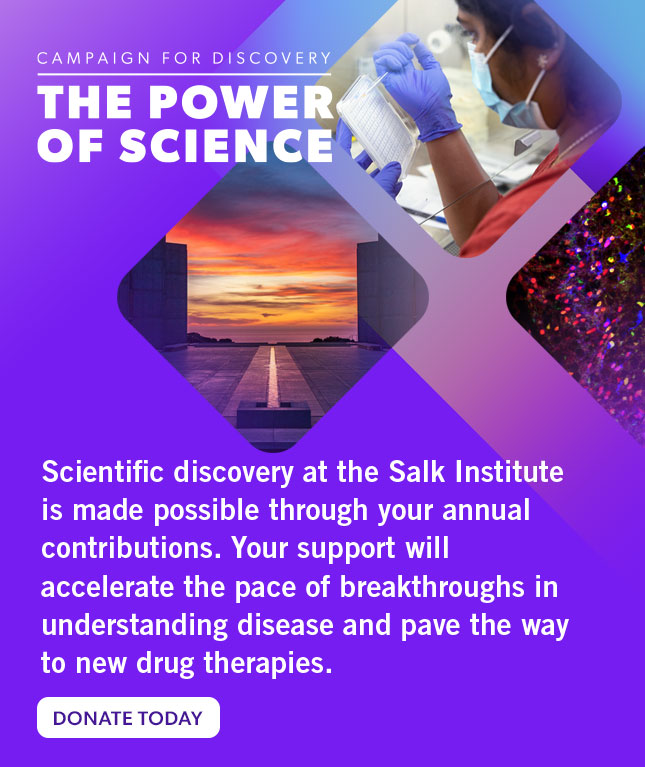Patients who suffer from hereditary pancreatitis (inflammation of the pancreas) have a 40 to 50 percent lifetime risk of developing pancreatic cancer. Assistant Professor Dannielle Engle and her team have provided the first evidence that a potentially powerful biomarker, CA19-9, causes the disease it has been correlated with, and they suggest that blocking this complex sugar could be used therapeutically to prevent the progression from pancreatitis to pancreatic cancer.
Read News ReleaseCancer
Unlocking therapies for hard-to-treat lung cancers
In two recent papers, Salk scientists revealed insights into the most common—and deadliest—type of lung cancer: non-small-cell lung carcinoma (NSCLC). Some patients with this cancer can be treated with targeted genetic therapies, and some benefit from immunotherapies, but the vast majority of NSCLC patients have no treatment options beyond chemotherapy. In Science Advances, Professor Marc Montminy, Professor Reuben Shaw, first author Laura Rodón and colleagues showed that NSCLC tumors can be targeted by drugs that keep a cellular “switch” called CREB from triggering tumor growth.
Additionally, as detailed in Cancer Discovery, Shaw, first author Pablo Hollstein and colleagues discovered precisely why an inactivated gene commonly mutated in NSCLC, called LKB1, can result in cancer development.The surprising finding highlights how LKB1 communicates with two enzymes that suppress inflammation in addition to cell growth and could lead to new therapies for NSCLC.
Read Science Advances News Release Read Cancer Discovery News ReleaseMapping normal breast development to better understand cancer
Breast cancer is one of the most prevalent cancers, and some forms rank among the most difficult to treat. Professor Geoffrey Wahl, co-first authors Christopher Dravis and Zhibo Ma and colleagues have used state-of-the-art technology to profile cells during normal breast development in order to understand what goes wrong in cancer. The team’s findings, shared in a free online resource, lay the groundwork for understanding normal breast development and may lead to new strategies for tackling tumors.
Read News ReleaseDiscovery of how colorectal cancer drug works may help patients
Colorectal cancer is a common lethal disease, and treatment decisions are increasingly influenced by which genes are mutated within each patient. Some patients benefit from a chemotherapy drug called cetuximab, but the mechanism was unknown, making doctors hesitant to prescribe it. Assistant Professor Edward Stites, first author Thomas McFall and colleagues have discovered the mechanism behind why some patients respond to cetuximab, which will help doctors identify more effective, targeted treatment plans for people diagnosed with colorectal cancer. The findings demonstrate the power of blending computational and experimental approaches, as well as how foundational scientific research can translate into an immediate impact for patients.
Read News ReleaseFeatured Stories
 The Promise and Perils of Big DataSalk scientists are unlocking the power of "big data" to make unprecedented discoveries in neuroscience, cancer and other areas.
The Promise and Perils of Big DataSalk scientists are unlocking the power of "big data" to make unprecedented discoveries in neuroscience, cancer and other areas.
 Joseph Noel – Learning from LagoonsInside Salk sat down with Noel to learn about his path to becoming a scientist and about his current work researching coastal wetlands to help combat climate change.
Joseph Noel – Learning from LagoonsInside Salk sat down with Noel to learn about his path to becoming a scientist and about his current work researching coastal wetlands to help combat climate change.
 Krishna Vadodaria – Uncovering the mysteries of depressionStaff Scientist Krishna Vadodaria's research on human neurons is helping to uncover the biological basis for psychiatric disorders and why some depressed patients do not respond to SSRIs.
Krishna Vadodaria – Uncovering the mysteries of depressionStaff Scientist Krishna Vadodaria's research on human neurons is helping to uncover the biological basis for psychiatric disorders and why some depressed patients do not respond to SSRIs. Corina AntalCorina Antal is not your typical researcher. From wrangling bull sharks to climbing mountains to seeking a cure for pancreatic cancer, Antal follows her passion.
Corina AntalCorina Antal is not your typical researcher. From wrangling bull sharks to climbing mountains to seeking a cure for pancreatic cancer, Antal follows her passion.




















































